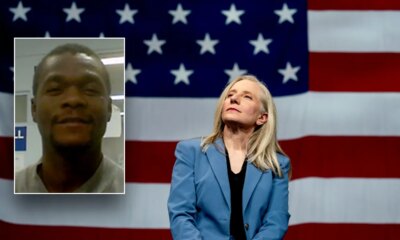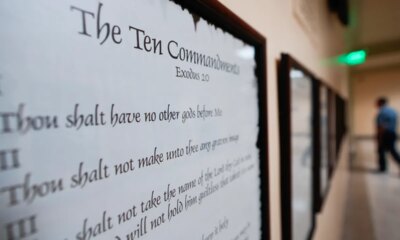Education
What’s Next for Mahmoud Khalil? A Fight to Keep His Case in New York.

The first legal battle for Mahmoud Khalil, the recent Columbia University graduate who was arrested and moved to Louisiana last week, is the fight to keep his case in New York.
The issue may seem minor compared with the First Amendment concerns raised by the arrest of Mr. Khalil, a legal permanent resident who was a prominent figure in pro-Palestinian demonstrations on the Columbia campus and whom the Trump administration is seeking to deport.
But where Mr. Khalil’s case is heard could have profound consequences, not just for him but for anyone else the White House targets for removal from the United States. If Mr. Khalil remains in Louisiana, his case is likely to end up in one of the nation’s most conservative appeals courts, which could determine whether the law the government has cited as the rationale for his detention is allowed to stand.
The White House has accused Mr. Khalil of siding with Hamas terrorists during the Columbia protests and spreading antisemitism. That accusation, which Mr. Khalil’s lawyers deny, is not criminal, and in fact, Mr. Khalil has not been charged with any crime.
Instead, Marco Rubio, the secretary of state, has cited a little-used law to justify the detention. The measure says Mr. Rubio can initiate deportation proceedings against any noncitizen whose presence in the United States he deems a threat to the country’s foreign policy aims.
That law, which would seem to grant the Trump administration almost unchecked power in deporting noncitizens, appears not to have been reviewed by an appeals court, which could determine whether it is constitutional. And if Mr. Khalil’s immigration case plays out in Louisiana, it will most likely be appealed to the U.S. Court of Appeals for the Fifth Circuit, which presides over federal court cases that come from Louisiana, Texas and Mississippi.
It is one of the country’s most conservative appeals courts. Most of its judges were nominated by Republican presidents, including six by President Trump during his first term.
“The Fifth Circuit is the court I’d least want to be in if I were Khalil,” said Steve Vladeck, a professor at Georgetown University’s law school who studies constitutional issues and has written about Mr. Khalil’s case. He added, “It is a court where immigrants in general have a historically poor track record, and it’s a court in which judges are going to be most sympathetic to the government’s ability to point at someone and say, ‘You supported Hamas.’”
If judges in that court were to decide against Mr. Khalil, he could appeal to the Supreme Court. But there is no guarantee that the justices in Washington would take his case, and even if they did and found in his favor, the government is likely to continue to revoke green cards in the interim, citing the same statute that informs Mr. Khalil’s case. Other detainees might have little legal basis to fight the government’s accusations.
On the other hand, if Mr. Khalil’s immigration case was to play out in New York — where his lawyers first called for his release — any appeal would arrive at the U.S. Court of Appeals for the Second Circuit. That court includes more judges appointed by Democratic presidents and is widely considered a less partisan venue. And in the meantime, Mr. Khalil, if he was released, would have access to his family. His wife, Noor Abdalla, is expecting a baby next month.
On Monday, Mr. Khalil’s lawyers also sought to stop the Trump administration from detaining and deporting others under the same justification. They asked the New York judge overseeing his case, Jesse Furman, to prohibit the government from enforcing what they called a policy of arresting, detaining and deporting noncitizens who expressed support for Palestinian rights or criticized Israel.
A spokeswoman for the Department of Homeland Security did not immediately respond to a request to comment on that characterization or on the lawyers’ move.
Mr. Khalil’s lawyers have sought his release and return to New York from almost the moment he was arrested, on the evening of March 8. The timing of his arrest and transfer to Louisiana is key to understanding their case.
Video of the arrest filmed by Ms. Abdalla and released by the American Civil Liberties Union shows that agents from the Department of Homeland Security handcuffed Mr. Khalil in the lobby of his apartment building, which is owned by Columbia. After his wife, holding back tears, repeatedly asked where Mr. Khalil was being taken, the agents responded “26 Federal Plaza,” the address of New York’s downtown immigration court. Amy Greer, one of Mr. Khalil’s lawyers, was told the same thing.
Ms. Greer worked through the night on a legal filing known as a habeas petition, a vehicle for challenging unlawful detentions. Occasionally, she checked an online locator to make sure of Mr. Khalil’s location. At 1:35 a.m. on March 9 and again at 4:29 a.m., the locator said that Mr. Khalil was in New York.
She filed her petition at 4:40 a.m. in a New York federal court, where it was assigned to Judge Furman. But the government has since said that Mr. Khalil arrived in New Jersey more than an hour before that. He was taken there, they say, because the New York facility does not have beds or overnight medical staff, and Immigration and Customs Enforcement policy dictates that no detainee should be held in such a facility for longer than 12 hours.
Around noon on March 9, Mr. Khalil was brought back into New York, to Kennedy International Airport. He was then flown to Dallas and then to Louisiana, where he has been held since.
The following day, Judge Furman ordered the government not to remove Mr. Khalil from the country. There is no indication that the government has ignored the judge as it may have in other recent deportation cases. Mr. Khalil’s first hearing in immigration court is scheduled for March 27.
The arguments in front of Judge Furman have piled up, with Mr. Khalil’s lawyers imploring the judge to return their client to New York and the government insisting that the proper venue for his case is the district in which he is being held.
The law that dictates where a case is heard is complex. The government has argued that, particularly since Mr. Khalil’s lawyers did not file their petition in the appropriate court, any detention case should be heard in Louisiana.
Mr. Khalil’s lawyers have argued that the government frustrated Ms. Greer’s efforts to file her petition in the right place. Accordingly, they argue, the law says that his case should be heard in New York.
Judge Furman could rule as early as Monday. He has insisted that he has no view on the issues at play in the case — which include core concerns about First Amendment rights amid Mr. Trump’s immigration crackdown and vow to fight antisemitism — but has acknowledged their importance.
If Judge Furman decides the case should not be heard in New York, Mr. Khalil’s lawyers have asked for the opportunity to transfer it to New Jersey. If the case were to play out there, any appeal would be heard in yet another appeals court — the U.S. Court of Appeals for the Third Circuit — and Mr. Khalil would be closer to his family.

Education
After F.B.I. Raid, Los Angeles School Board Discusses Superintendent
Board members are having an emergency meeting a day after agents raided the home and office of Alberto Carvalho, the Los Angeles Unified School District superintendent. The F.B.I. also searched the Florida home of a consultant with ties to the schools chief.
Education
How A.I.-Generated Videos Are Distorting Your Child’s YouTube Feed
Experts caution that low-quality, A.I.-generated videos on YouTube geared toward children often feature conflicting information, lack plot structure and can be cognitively overwhelming — all of which could affect young children’s development.
Education
Video: Blizzard Slams Northeast with Heavy Snow, Disrupting Travel

new video loaded: Blizzard Slams Northeast with Heavy Snow, Disrupting Travel
transcript
transcript
Blizzard Slams Northeast with Heavy Snow, Disrupting Travel
Several cities across the Northeast received at least two feet of snow, bringing many places to a standstill.
-
“I hope our students enjoy their snow day today and stay warm and safe throughout, but I do have some tough news to share. School will be in-person tomorrow. You can still pelt me with snowballs when you see me.” “It’s probably about the worst I’ve seen. I mean, I was here with the last big storm. I think that was where in 2016 or something. But it wasn’t as bad as this. And the problem is, when the plows come past, they just throw up all the snow. And there’s going to be a big bank here later. So I’m digging it out now to get rid of some of this.” “I do ski patrol on the Lower East Side. I like to check the parks, and sometimes I find people fall in the snow and they can’t get up, like a elderly gentleman went out in his pajamas to get a quart of milk. So, things like that.” “And if you can cook at home, please do so instead of ordering food to be delivered given the conditions. Make an enormous pot of soup and bring some to your neighbors upstairs.”

By Meg Felling
February 23, 2026
-

 World3 days ago
World3 days agoExclusive: DeepSeek withholds latest AI model from US chipmakers including Nvidia, sources say
-

 Massachusetts3 days ago
Massachusetts3 days agoMother and daughter injured in Taunton house explosion
-

 Montana1 week ago
Montana1 week ago2026 MHSA Montana Wrestling State Championship Brackets And Results – FloWrestling
-

 Louisiana5 days ago
Louisiana5 days agoWildfire near Gum Swamp Road in Livingston Parish now under control; more than 200 acres burned
-

 Denver, CO3 days ago
Denver, CO3 days ago10 acres charred, 5 injured in Thornton grass fire, evacuation orders lifted
-

 Technology1 week ago
Technology1 week agoYouTube TV billing scam emails are hitting inboxes
-

 Technology1 week ago
Technology1 week agoStellantis is in a crisis of its own making
-

 Politics1 week ago
Politics1 week agoOpenAI didn’t contact police despite employees flagging mass shooter’s concerning chatbot interactions: REPORT























